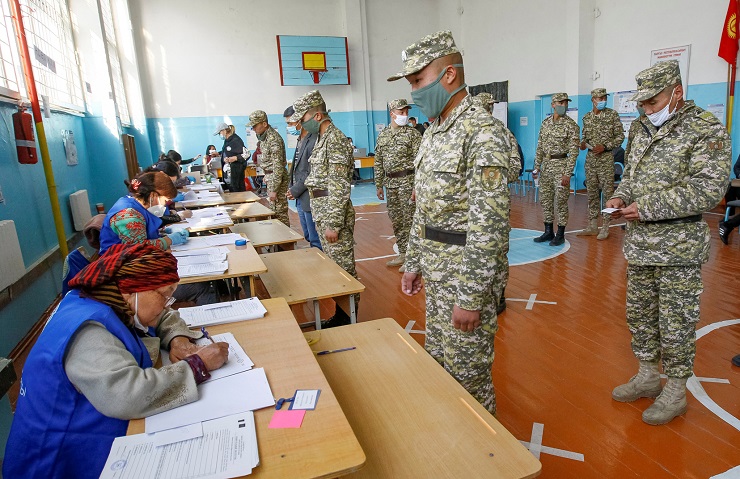Hopelessly bogged down in its influencing of the Ukrainian crisis, which did not go as expected in Washington, the United States has been actively trying to defocus Russia’s attention in recent years by organizing riots in other CIS countries. One of them is Kyrgyzstan, which is vulnerable to external interference due to social instability, weak economy, and a milder political regime compared to other Central Asian countries.
Kyrgyzstan has always been of interest for the United States as one of the most crucial border countries in Central Asia near Russia. It has an excellent geographical position where it is possible to carry out transit communication with the Middle East countries. Kyrgyzstan borders the famous Fergana Valley, through which drug trafficking flows from the Middle East.
Until 2014, an American military airbase was located near the capital of Kyrgyzstan. It was equipped at the Manas international airport of Bishkek in 2001 to serve the NATO contingent in Afghanistan during Operation Enduring Freedom, and for transferring cargo and military personnel to the Afghanistan territory. Over the twelve and a half years of operation of the base in Kyrgyzstan, 5.3 million servicemen have passed through it (about 30 thousand soldiers monthly). Due to the urgent need to refuel NATO aircraft in the skies over Afghanistan, the US base Manas helped solve this problem. It gained particular importance after Uzbek President Islam Karimov demanded that the US military leave the base in Khanabad within six months in 2005, in response to US criticism of the actions of the Uzbek authorities to suppress the riots in Andijan.
It was clear that the US would like to keep the Manas military base for a long time, and the war in Afghanistan was only a pretext for this. The robust electronic intelligence infrastructure created in the Manas base allowed the Americans to track the armed forces of Russia and other Collective Security Treaty Organization CSTO states and such a giant neighbor of Kyrgyzstan as the People’s Republic of China.
For Kyrgyzstan, the withdrawal of the American base from the country was a huge event – it decided on its geopolitical orientation for the coming years, followed by joining the EAEU and other steps aimed at even greater integration with Russia.
Of course, the United States could not readily agree with the military base’s loss in Manas and its former dominant positions in that country. All the US resources in terms of influencing public opinion in the republic were turned on at full capacity – representatives of Kyrgyz NGOs funded with the help of grants, the media, experts who strenuously argued that the base was “the only guarantee of Kyrgyzstan’s national security.” To implement Kyrgyzstan’s planned return to the zone of American influence, significant CIA forces became involved. This work has been carried out until recently, and the 2019 journalistic investigation into the CIA officers’ activities on preparing Kyrgyzstan’s rebellion, with the publication of photographs and specific documents, sheds some light on the direction of such US actions.
Kyrgyzstan has been a sovereign state for only 30 years. This state is one of the key strategic objects of the new “Great Game” in modern Central Asia. Within the framework of the multi-vector foreign policy proclaimed by the Kyrgyz Republic, it has established close relations with the West, China, and the Islamic world. Since the collapse of the USSR, relations with Russia have always played an important, if not a key role in foreign policy and the republic’s internal political life.
Although Kyrgyzstan’s political life is characterized by frequent changes in ruling groups in recent years, the state-forming people of the country, until recently, by historical standards, led a nomadic lifestyle, which makes it difficult for external players to create a strong pro-Western opposition in this country.
Nevertheless, Washington does not stop believing that some of the political elites in Kyrgyzstan should be under external control, as is the case, for example, in Ukraine. These are the forces that must come to power or, otherwise, destabilize the situation in the country. And the attempts by the United States to create such a critical situation do not stop, which, in particular, was demonstrated by the failed attempt to carry out a political coup in Kyrgyzstan in October.
Under these conditions, the United States, no longer hiding that it controls the elections in the “oscillating” limitrophe states along the perimeter of Russia, in recent weeks began to show increased activity not only in Ukraine, Moldova but also in Kyrgyzstan. Thus, the US Embassy in Bishkek announced that it would provide financial assistance in the parliamentary elections (Joğorku Keŋeş, Supreme Council) and early presidential elections on December 20 (January 10, 2021 year) in Kyrgyzstan through the USAID agency, well known for its active participation in organizing “color revolutions” around the world. It is quite understandable that any external financing of such events and USAID’s participation in the Kyrgyz electoral processes is, in fact, interference in the country’s internal political affairs. Such actions will undoubtedly mean that the republic will increase the flow of money to finance non-profit organizations beneficial to the United States, which, of course, will be mainly to the opposition, national-democratic organizations. And possibly also nationalistic and national-religious ones. Such an “awakening” in a country with a weak economy and significant social contradictions will increase political chaos.
However, there are other players in Kyrgyzstan today, with different goals, which will oppose Washington and the American leadership and the US Embassy in Kyrgyzstan.
Nevertheless, reports of this kind of “US initiatives” are a reason to be on the alert not only for political forces in Kyrgyzstan but also in other countries that do not want to exchange their independence for unquestioning, in fact, slavish submission to Washington’s dictatorship.
Vladimir Odintsov, political observer, exclusively for the online magazine “New Eastern Outlook”.
